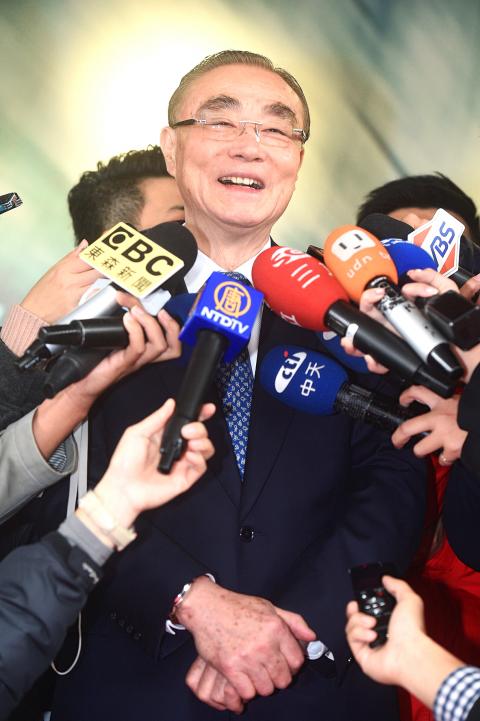China sailing its aircraft carrier near Taiwan has highlighted the need for the nation to go ahead with a plan to build its own submarines, Minister of National Defense Feng Shih-kuan (馮世寬) said yesterday.
The indigenous submarine project would not only protect the nation’s territorial security, but also allow Taiwan to contribute to regional security, Feng said at the opening of an exhibition on the history of the navy’s submarine fleet.
In what was seen by many as saber-rattling by Beijing, the Liaoning, China’s first aircraft carrier, sailed south in the Pacific Ocean off Taiwan’s eastern coast on Christmas Day before entering the South China Sea.

Photo: George Tsorng, Taipei Times
On Wednesday, the Liaoning passed through the Taiwan Strait on its way back to its base in northeastern China after conducting training exercises in the South China Sea.
The last time the aircraft carrier transited the Taiwan Strait was in November 2013.
At the ceremony, Feng said that the Ministry of National Defense publicized information to inform the public on the Liaoning’s movements, but stressed that “no special situations” were detected.
According to standing plans for the manufacturing of submarines, the ministry has been negotiating with CSBC Corp, Taiwan (台灣國際造船), the intended contractor, the ministry said, adding that if all goes according to plan, a prototype for the first submarines would undergo combat trials in 2024 and enter service in 2025.
Separately yesterday, former American Institute in Taiwan director Douglas Paal told the Central News Agency that recent aerial and maritime exercises by China’s armed forces near Taiwan were an example of Beijing showcasing its growing military strength and not a show of force directed at Taipei.
“As long as China’s military capabilities continue to grow, we expect to see Beijing expand its maritime activities in the days ahead,” Paal said.
Asked about saber-rattling by Beijing and demands that US president-elect Donald Trump abide by the “one China” policy, Paal said that as Trump has yet to assume office, all China can do is to issue stern statements to express its displeasure.
However, regarding Beijing’s recent threat to “take revenge” if Trump moves away from the “one China” policy, Paal said that the warning is real.
Asked if he expected Beijing to continue its effort to poach Taiwan’s diplomatic allies, such as the severing of diplomatic relations with Sao Tome and Principe on Dec. 20, Paal said the incident with the west African nation was probably driven by interests other than China’s desire to punish Taiwan.
Additional reporting by Aaron Tu

INVESTIGATION: The case is the latest instance of a DPP figure being implicated in an espionage network accused of allegedly leaking information to Chinese intelligence Democratic Progressive Party (DPP) member Ho Jen-chieh (何仁傑) was detained and held incommunicado yesterday on suspicion of spying for China during his tenure as assistant to then-minister of foreign affairs Joseph Wu (吳釗燮). The Taipei District Prosecutors’ Office said Ho was implicated during its investigation into alleged spying activities by former Presidential Office consultant Wu Shang-yu (吳尚雨). Prosecutors said there is reason to believe Ho breached the National Security Act (國家安全法) by leaking classified Ministry of Foreign Affairs information to Chinese intelligence. Following interrogation, prosecutors petitioned the Taipei District Court to detain Ho, citing concerns over potential collusion or tampering of evidence. The

‘FORM OF PROTEST’: The German Institute Taipei said it was ‘shocked’ to see Nazi symbolism used in connection with political aims as it condemned the incident Sung Chien-liang (宋建樑), who led efforts to recall Democratic Progressive Party (DPP) Legislator Lee Kun-cheng (李坤城), was released on bail of NT$80,000 yesterday amid an outcry over a Nazi armband he wore to questioning the night before. Sung arrived at the New Taipei City District Prosecutors’ Office for questioning in a recall petition forgery case on Tuesday night wearing a red armband bearing a swastika, carrying a copy of Adolf Hitler’s Mein Kampf and giving a Nazi salute. Sung left the building at 1:15am without the armband and apparently covering the book with a coat. This is a serious international scandal and Chinese

Seventy percent of middle and elementary schools now conduct English classes entirely in English, the Ministry of Education said, as it encourages schools nationwide to adopt this practice Minister of Education (MOE) Cheng Ying-yao (鄭英耀) is scheduled to present a report on the government’s bilingual education policy to the Legislative Yuan’s Education and Culture Committee today. The report would outline strategies aimed at expanding access to education, reducing regional disparities and improving talent cultivation. Implementation of bilingual education policies has varied across local governments, occasionally drawing public criticism. For example, some schools have required teachers of non-English subjects to pass English proficiency

TRADE: The premier pledged safeguards on ‘Made in Taiwan’ labeling, anti-dumping measures and stricter export controls to strengthen its position in trade talks Products labeled “made in Taiwan” must be genuinely made in Taiwan, Premier Cho Jung-tai (卓榮泰) said yesterday, vowing to enforce strict safeguards against “origin laundering” and initiate anti-dumping investigations to prevent China dumping its products in Taiwan. Cho made the remarks in a discussion session with representatives from industries in Kaohsiung. In response to the US government’s recent announcement of “reciprocal” tariffs on its trading partners, President William Lai (賴清德) and Cho last week began a series of consultations with industry leaders nationwide to gather feedback and address concerns. Taiwanese and US officials held a videoconference on Friday evening to discuss the